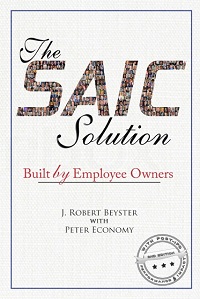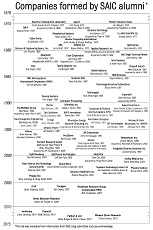Can the United States Be Competitive?
6 Comments Published by Dr. Beyster February 9th, 2011 in Competitiveness.If you’ve been following my blog for a while, you may remember that I am personally worried about the long-term competitiveness of the United States on the world stage. This is a topic I posted on in 2006, and from what I have seen, things have not gotten any better in the four years since. While you will find few people any more hopeful for the continued greatness of our nation than I am, I do believe we have reason to be concerned for the future.
In December 2010, the Organization for Economic Cooperation and Development (OECD) released the results of its 2009 Program for International Assessment (PISA) test. The PISA test is administered to thousands of 15-year-old students in 65 different countries around the world, and results are provided in three areas: science, math, and reading.
Unfortunately, the results were not good for the United States, and they underscore the need for us to pay much greater attention to the education of our young people—particularly in the areas of science and math.
In the area of science, the United States ranked 23rd on the PISA test with a score of 502, well below Finland (554), Hong Kong, China (549), Singapore (542), Japan (539), Korea (538), and New Zealand (532), and just one point above the average score on this subject area of 501. Number 1 on the test? Shanghai, China with a score of 575.
And when it came to math, the United States fared even worse, ranking 32rd on the PISA test with a score of 487. This score was 10 points below the average score of the 65 participating countries (497). Number 1 was again Shanghai, China with a score of 600, followed by Singapore (562), Hong Kong, China (555), Korea (546), Taiwan (543), and Finland (541). Even former Eastern Bloc countries such as Estonia (512), Slovakia (497), and Hungary (490) outscored us in math.
If there was any good news to be had from the PISA test, it was in the area of reading, where the U.S. had its best performance, ranking 17th with a score of 500, which was above the average score of 494. Shanghai, China again captured 1st place with a score of 556, followed by Korea (539), Finland (536), Hong Kong, China (533), Singapore (526), Canada (524), and New Zealand (521).
These results echo the reports I have seen for some time now that we are falling behind much of the world in the areas of math and science. This does not bode well for the future, especially since our economy is moving from relatively low-skilled manufacturing jobs to much higher-skilled knowledge jobs. What if there aren’t enough Americans to fill the future needs of our technology sector? Where will we find these vital employees if our schools and communities aren’t producing them?
Many people are diligently working to devise solutions to this problem, but I don’t see any magic bullets on the horizon. What do you think we should do about it?
* * *
I would like to remind those of you who have Facebook accounts that I am now on Facebook too. Here is the link to my page. My blog posts show up automatically on my Facebook page soon after I post them.
– Bob





Dr. Beyster,
You might be interested in this recent NY Times article. The study discussed reports that only 22% of California’s fourth graders meet national proficiency standards in science. http://www.nytimes.com/2011/01/26/education/26test.html?ref=samdillon
I’m interested in the topic because I work at the San Diego Public Library Foundation. Working in partnership with area schools and high-tech employers, the Library is working to bridge this gap in math and science proficiency. The Library has added after-school science enrichment programs and free online tutoring. Interestingly, 85% of tutoring requests have been for high school math and science.
Aware that science and technology fields are a vital part of San Diego’s economy, there is also a group working to define the kind of charter high school that is going into the New Central Library.
I certainly hope that the US can be competetive but it’s going to take focused efforts to turn around the current trends.
Megan: Thank you for your note. It concerns me that only 22% of California 4th graders meet national proficiency standards in science. It is shameful, and a more serious problem than I thought. This is a result that we certainly cannot be proud of, and it does not bode well for our nation. It sounds like the San Diego Public Library is aware of this problem and is taking action to help solve it. I applaud you for your efforts and hope that you are able to improve the standings of San Diego’s youth. We need to find more ways to interest American young people in science and math. What other things do you think that we should be doing? — Bob
I think you have summarized a fundamental issue we need to come to terms with. How are we changing as a nation? What does it mean? Where is it going?
Your questions: “What if there aren’t enough Americans to fill the future needs of our technology sector? Where will we find these vital employees if our schools and communities aren’t producing them?”
The obvious answer is these vital employees will come from other countries!!There are billions of people in countries that have been doing low-skilled manufacturing jobs. Some of these nations are tired of being part of the “third world” and are willing to work hard to make changes happen.
Hardship is the great motivator. America doesn’t have that like the rest of the world does. We are spending our future, resting on our laurels…. and falling behind.
Perhaps “Made in China” will become associated with technology and high quality… and children around the world will play with cheap plastic toys “Made in the USA”.
“Improve competitiveness†is a mantra frequently heard in discussions of how countries can increase economic growth. What that slogan actually means is that global corporations want workers in developed countries to agree to wage reductions to levels similar to those in the People’s Republic of China. The unspoken threat is that workers will be driven to accept such reductions inevitably.
Wages in China are actually rising due to the country’s success in extracting manufacturing jobs from the rest of the world. The correct policy that should be pursued by developed countries and China is to have the PRC adjust its labor markets so that Chinese workers’ wages continue to converge with those of workers in developing countries.
Increased standards of living for Chinese workers will mean less of a reduction in standards of living in developed countries. In some industries, Chinese goods are already not competitive with similar goods produced in developed countries due to transportation costs.
Executive management currently colludes with a corrupt PRC system to extract the value of increased productivity throughout the world to increase the wealth of the top 1% of society…the super-rich. Workers throughout the world need to organize to reject the “competitiveness†propaganda and restructure the distribution of wealth more fairly.
Darin: Yes, there will always be a draw for scientists and researchers to come to the U.S. to fill the many technology job vacancies that we are now experiencing, and will likely continue to experience in the future. However, I believe we should strengthen our own ranks of technology workers and not rely on foreign nationals to fill these positions. This begins in our K-12 public school systems, and continues on through college and graduate school. — Bob
Scott: Thank you for your post. You are correct that wages in China are going up, as is the standard of living. I do not agree, however, that becoming more competitive necessarily means that wages in the developed world have to decrease to be on par with the non-developed countries. There are other routes to that outcome, including technological innovation and increased worker efficiencies. — Bob